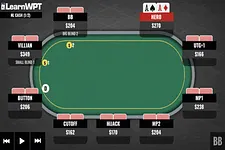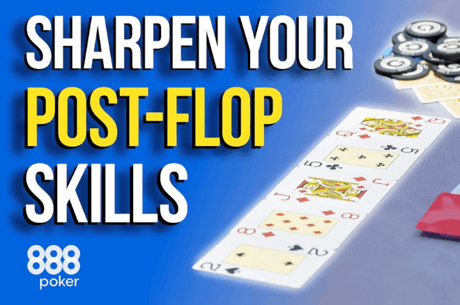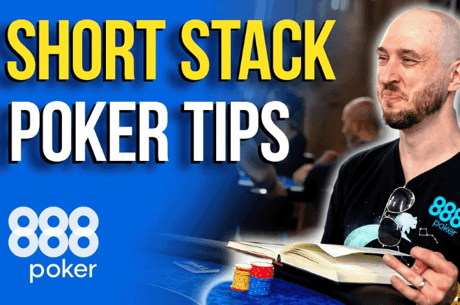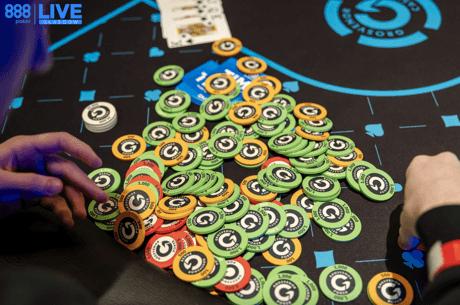Knowing the Bottom of Your Range When Deciding Whether or Not to Bluff

It pays to find the bottom of your range as you will be emboldened to bluff with it when you should, but also less likely to relent when you have a hand that is a bit distant from that bottom.
Some players need such a guide to rein in the aggression as they get in a rhythm of pressing the bet button and just can't stop dancing towards ruin.
The Eager Rec vs. the Savvy Reg
We return to the 100NL ($0.50/$1) six-handed Zoom tables where a recreational player — someone who only joins the games on the weekends — raised from the cutoff to $2.50.
There was a flat-call from the button, then a strong regular playing a big stack in the small blind three-bet to $14. The recreational player, up on the session so far and playing a stack of $190, called the three-bet. The button was also deep-stacked, but got out of the way.
The flop came K♣4♦4♥, and the strong regular continuation bet $14. The recreational player called and the turn brought the Q♠.
Our small blind three-bettor has a pretty large range advantage in this situation, meaning it would therefore be prudent to bluff again with any AxJx or Ax10x combinations he might have. He does not have many bluff candidates on a full rainbow board such as this otherwise.
The small blind checked, however. Now his hand looks like QxJx or AxQx that paired the turn. Maybe he continuation bet 10x10x or JxJx that has to slow down. We need not pin down his range exactly now, we'll learn quite a bit shortly.
The recreational player loaded the cannon and fired $35 into a pot of just under $60. The small blind — who to repeat, is a wily, experienced regular — called.
What You Already Bluffed
When faced with a considerable bet on the turn portending a river all-in, do you think a disciplined regular would check-call this turn with a pair worse than the queen on the board?
It seems that, if he continuation bet those hands (having squeezed with them in the first place), he is probably check-folding the turn once his opponent chooses such a large bet size. Whether he thinks he is ahead or not does not really matter — he knows his range and knows he has better hands in that range than pocket tens to handle what's coming.
To look at it from the recreational player's perspective, he should consider pocket jacks and pocket pairs worse than jacks to have already been bluffed out of his opponent's range. If he is going to bluff the river, which he may be fixing to do, he needs to pick another candidate of hands to bluff.
This, logically, would be the weakest hand in the small blind's range. At this juncture that would be something like Qx9x.
River Madness
The river was the 4♣, making the final board K♣4♦4♥Q♠4♣, and for the second time the small blind checked.
Now it is very unlikely to see how many hands the recreational player could expect to fold out. After all, he got jacks to fold the turn, and any queen now has a full house. The only hand a queen fears is a king.
Our recreational player, moreover, has fewer kings in his range than he might otherwise. He would four-bet ace-king some amount of the time, and if his opponent has a queen, there are only six remaining combinations of KxQx (2 queens x 3 kings) from the 16 that were possible preflop.
The recreational player went all in for a whopping $125, and the small blind instantly called with K♦Q♣, perhaps feeling on the turn he had locked up the board and might as well let his opponent bluff.
There is no real reason to think the small blind can't protect his turn check-calling, river-checking range by checking some strong hands on the turn (even though this time he fooled their opponent into thinking so).
Most interesting of all, the recreational player in the cutoff showed 6♣6♥.
Bluffing With a Full House
It sounds mental, and in this case, it may well have been. Recall our analysis of the turn. If we presume that pocket sixes should bluff the turn, he should be confident he achieved that with his over half-pot bet size into an inflating three-bet pot.
But should he bluff the turn? Does not the in-position player have better candidates with which to bluff than pocket sixes? Like AxJx-suited that floated the flop, or Ax5x-suited that did likewise. Even 2x2x is better to bluff than 6x6x.
Why bluff with pocket sixes when you could with ace-jack? Really the premise is that simple.
Moreover, it is a bit questionable to bluff if your opponent can have a lot of hands, both better and worse, and your bluff only folds out those hands that are similar in strength to yours. That is the effect of the turn bet. Sure, pocket sixes is vulnerable to many cards in this situation, but the recreational player can take stronger hands to the river, like Kx10x-suited and AxQx, to buttress such vulnerable combinations.
The other possibility is that the turn bet was meant to protect what he considered the best hand, and the fact that he was called caused some reconsideration. The turn bet, river shove succession here with 6♣6♥ doesn't much look like someone with a plan. He started betting and couldn't stop.
This is a very costly habit — here it cost a player having a good session one-and-a-half buy-ins— and it would save a lot of players a lot of money to break it.










